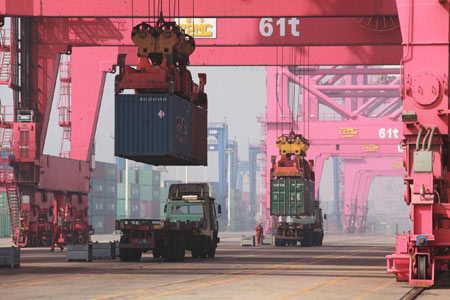Economy
China reports largest trade deficit in 7 years
Updated: 2011-03-10 16:29
(Agencies)
|
|
China swung to a surprise trade deficit of $7.3 billion in February, its largest in seven years, as the Lunar New Year holiday dealt an unexpectedly sharp blow to exports.
It was China's first trade deficit since March last year and its biggest since February 2004. Economists, who had forecast a small surplus of $4.95 billion, said the sudden drop was likely to prove temporary.
|
||||
"There is little chance that China will have a trade deficit again, and the monthly trade surplus may pick up in the second half of this year," he added.
Still, the extent of the slowdown in both exports and imports caught markets by surprise. Asian stocks tumbled on worries that monetary tightening in China and other emerging markets was taking a real chunk out of economic growth.
The deficit will be welcome news on two fronts for the Chinese government, helping it dampen inflationary pressure and deflect calls for faster yuan appreciation.
Cash inflows from the country's vast trade surplus over the past few years have been an important factor in China's recent run-up in prices.
Inflation reached a 28-month high of 5.1 percent in the year to November. Data due on Friday is expected to show it pulled back to 4.7 percent in February.
With tightening policies beginning to have an impact, China is confident that it can achieve its 2011 goal of holding inflation to an average of 4 percent this year, Ma Jiantang, the government's statistics chief, said on Thursday.
His comments followed a media report that bank lending in February was much less than expected, indicating that Beijing has scored some success in reining in credit issuance, a crucial part of its campaign to control inflation.
Until that number is confirmed, though, attention will be squarely on China's precipitous drop in exports.
China exports grew 2.4 percent in February from a year earlier, the customs agency said on Thursday, well short of forecasts for a rise of 26.2 percent.
Imports increased 19.4 percent, missing market expectations of a 32.3 percent increase.
The data hit markets when investors are already worried that high oil prices will undermine global growth. Japan's Nikkei stock average fell 1.5 percent and stocks elsewhere in Asia slid 1.4 percent.
"It's come on a day when commodity prices are off, and investors are worried about global growth and it's just accentuated the market pullback," said Shane Oliver, head of investment strategy at AMP Capital Investors.
"The Lunar New Year does heavily distort Chinese trade data and I'll be inclined not to read too much into it. But the market is obviously feeling nervous and has probably read a bit more into it."
Specials

NPC & CPPCC sessions
Lawmakers and political advisers gather in Beijing to discuss major issues.

Labor crunch
Worker scarcity is no longer confined to eastern areas, minister says.

Water & Luck
People spray each other with water to express good wishes in Dongguan, Guangdong province.


